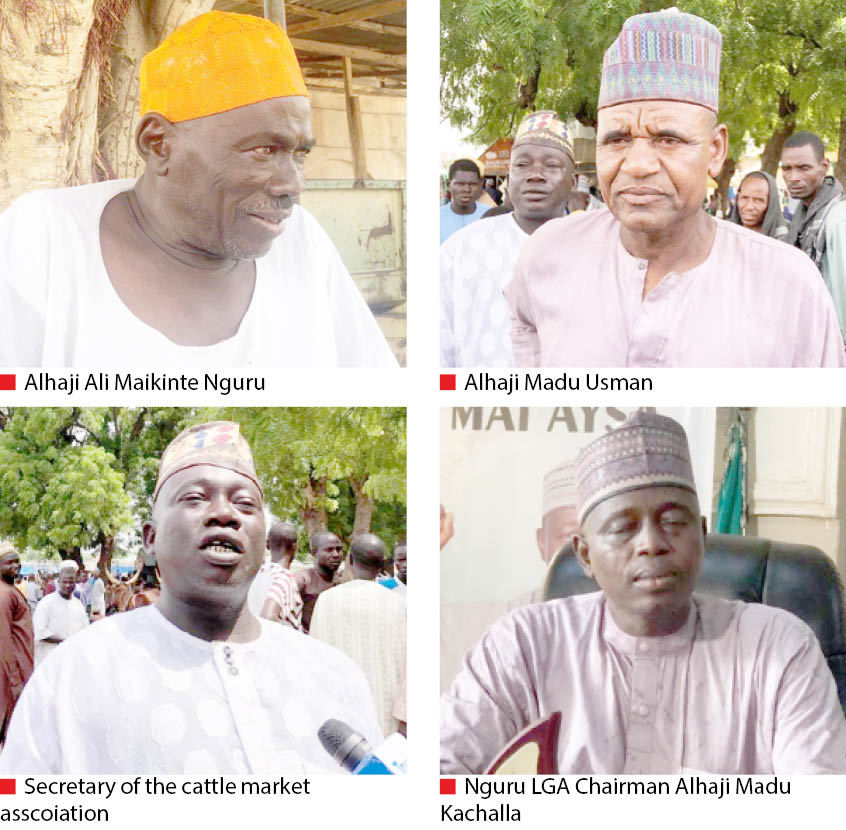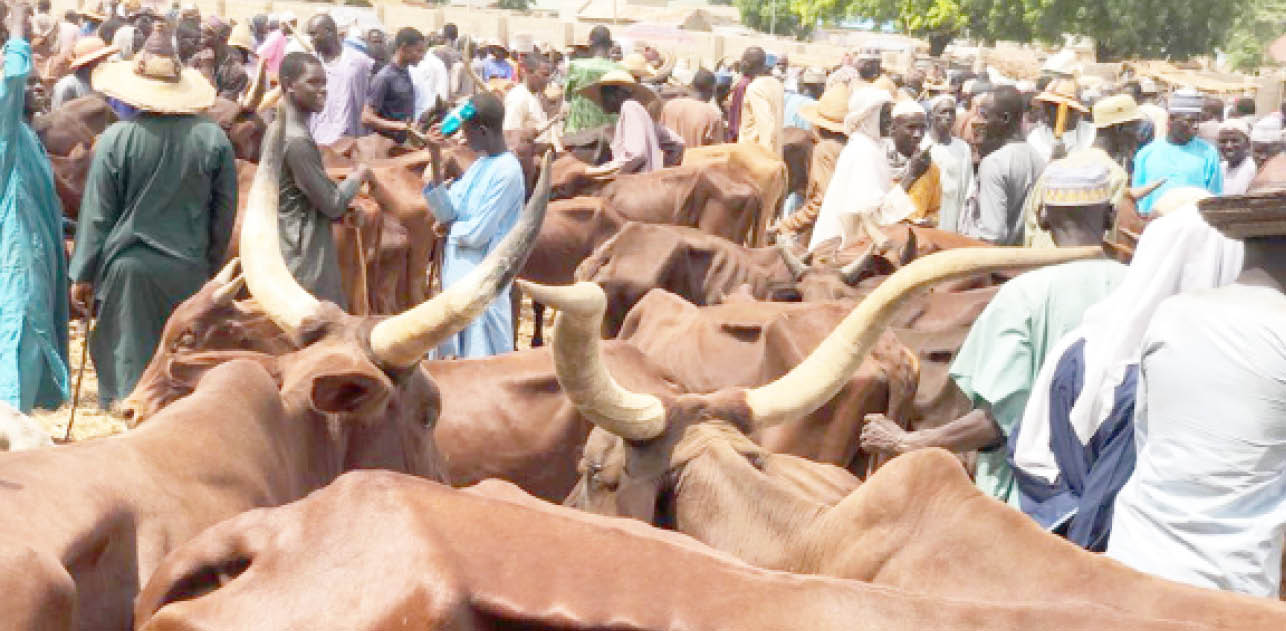The Nguru cattle market, located in Yobe State, the northeastern part of Nigeria, is said to be one of the largest in the country. It supplies animals to different parts of Nigeria, especially the South. The market, which history could be traced to the early 1980s, serves as a hub for various types of animals.
Daily Trust Saturday gathered that aside from cattle, different types of animals are imported into the market from within and outside the country, such as Niger and Chad, thereby providing job opportunities to thousands of people, as well as generating revenue for the country. It also boosts trade relations between Nigeria and some neighbouring African countries.
Located in the centre of Nguru Local Government Area, the cattle market is linked with the popular Kano-Nguru train station, which makes transportation of animals easier between the two big cities and other places. People familiar with the history of the market said the booming cattle market was one of the major reasons for establishing the train station, which is as old as its age.
When our correspondent visited the market, which operates on Tuesdays and Wednesdays, it was busy with people coming in to buy or sell animals. It encompasses all types of animals, including camels and cows.
Speaking to Daily Trust Saturday on the historical background of the market, an elder statesman in the local government area, Alhaji Ali Maikinte Nguru, said that since it was established, it had been serving not only Nigeria but other countries.
- Strike: FG implements ‘no work, no pay policy’ against resident doctors
- Police arrest 12 kidnap suspects, rescue 10 victims in Bauchi
Although he could not recall the exact date it was established, the elder statesman said it was the reason the train station was established and opened up business opportunities.
Maikinte said the train station, which is no longer operating in the local government area, made transportation of animals from Nguru to Kano, Lagos and other cities in the country and even beyond easier.
“Our cattle market made trade and marital relationships easier with our neighbouring countries. We married from Niger Republic and they also married from us. There was a cordial trade relationship. They bought cattle from us and we bought from them. Some of our people entered their country and bought animals.
“The market has given us a good name in the entire country. The historical background of Nguru will never be complete without mentioning the cattle market. It is the root of our development,” the elderly man said.

However, decades after, the market is no longer what it used to be. The marketers lamented over poor management and lack of attention, as well as the lingering Boko Haram and farmer-herder crises in the North East, which further worsened the situation of the market.
Daily Trust Saturday reports that the market is facing numerous existential challenges as some of their major customers are considering other places for business.
One of the major cattle sellers, Usaini Sani, told our correspondent that things had changed in the market and they were losing their capitals on a daily basis. He attributed the situation to lack of concern from the authorities.
“We have heard of several supports from the government to many marketing sectors, but cattle dealers were not included. Nobody has ever come here to include us in any support the government is offering to marketers. At this trying time, our capital is going down. We need to be supported,” he said.
Another cattle dealer, Malam Shalto Nguru, said the market operated two times in a week and that every two days, at least 10 to 15 trailers of cattle are loaded for transportation to the southern part of the country. This is aside the ones supplied to other parts of the North, such as Kano through train or other means of transportation.
Malam Shalto, who said he had been in the business for over 25 years, noted that it remained their major source of income. He added that the market accommodated people from Niger Republic and many Fulani herders from various parts of Nigeria.
“From here, we take our cows to Lagos, Isheri, Ibadan and Ilorin. Some of us take theirs to Lokpanta in Abia State and other southeastern parts of the country. But sometimes, within these villages in the South we encounter challenges as some of them will kill and burn our cows and even our people.
“During the dry season, we take over 30 trailers from here to the South. The business is really employing many people, and that is why we need to be considered. However, it is no longer booming as before,” he said.
The secretary of the association of cattle dealers in the market, Jibrima Usman, said over 50,000 were earning a living from the market in one way or another. He said cows and camels were bought from Niger Republic and taken to Lagos and neighbouring countries to the southern part of Nigeria.
“This is a big market in the country in terms of cows, if not the biggest. We are united and always working towards making it better. It provides thousands of job opportunities. We have a strong union that stands for its members and punishes them whenever they go wrong,” he said.
He attributed some of the challenges facing the market to the present fuel subsidy removal and lack of attention from the government, which he said had frustrated some people out of the business.
He said, “We have played a significant role in the development of this town. Nguru is one of the most populous places in Nigeria. And this became achievable through this market. But unfortunately, the government is not even looking at it.
“The attention of government is not here. You will see big markets like this with banks and other modern developments, but in our own case, it is not. We don’t have a bank and we don’t have access to any loan or intervention from the government. This is one of the biggest contributing factors to our problems and it is seriously taking the market backward.”
On his part, Hardo Bello, the chairman of the Miyetti Allah Cattle Breeders Association of Nigeria (MACBAN), Nguru Local Government, said the blockage of cattle routes across Niger Republic and Nigeria was causing serious challenges to the smooth movement of cows and camels from various villages into the market.
“This is our major challenge nowadays. Bringing the cows here is not easy. Farmers have blocked all our ways. We don’t have routes to follow. If we pass through their farms, there will be a problem. And if we follow the road there will be accidents. So what are we going to do? This has seriously affected the market,” he lamented.
Another marketer, Madu Usman said they were also facing challenges with security officers on the highways as they are chasing away their customers. He said they discouraged them from coming to the market because of unnecessary checks on the road, which further delay the customers while they are coming or going out with their animals.
“Security officers are always delaying the process. Animals need to always be moved to where they are meant to be on time; otherwise some will fall sick or even die. Customers who come here to buy also face many threats from the officers; which discourage most of them,” he said.
He added that train was aiding their business by transporting the cattle at subsidised prices and safer ways, but for almost a year now, it has not been coming to the state.
For the chairman of Nguru Local Government Area, Alhaji Madu Kachalla, the state government is putting in available resources to improve the market, which he admitted attracted thousands of people coming into the state.
“The cattle market has played a significant role in the development of this local government area. It is the root of our development, which makes Nguru among the most historic and big cities in the country. So we will not let it perish. We are doing everything possible for it to remain and even become better than it was. Recently, we fenced the market to avoid losing animals, as well as bad elements in the market.
“We visited officials of the train station and had talks with them on why the train is no longer coming to this place. They are working on returning the train. We also want them to expand so that cattle and other goods can easily move from here to Lagos directly,” Kachalla said.

 Join Daily Trust WhatsApp Community For Quick Access To News and Happenings Around You.
Join Daily Trust WhatsApp Community For Quick Access To News and Happenings Around You.

